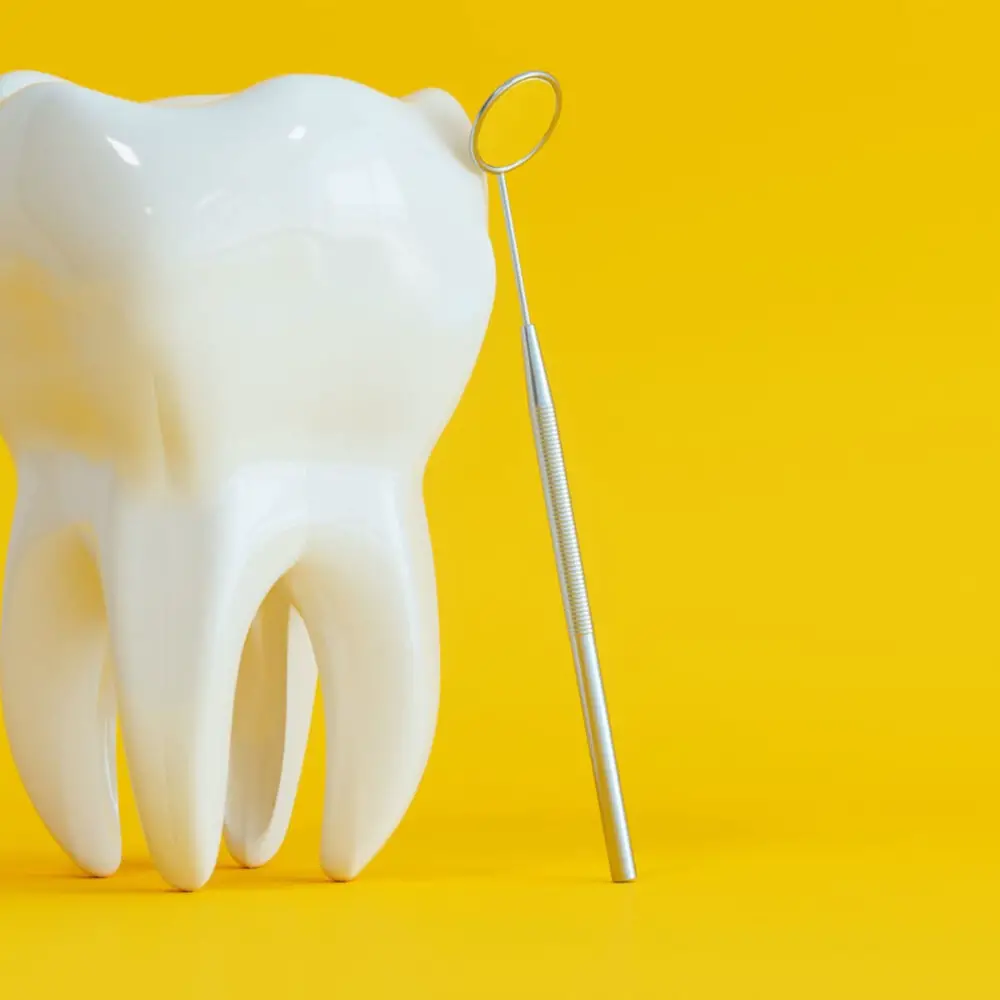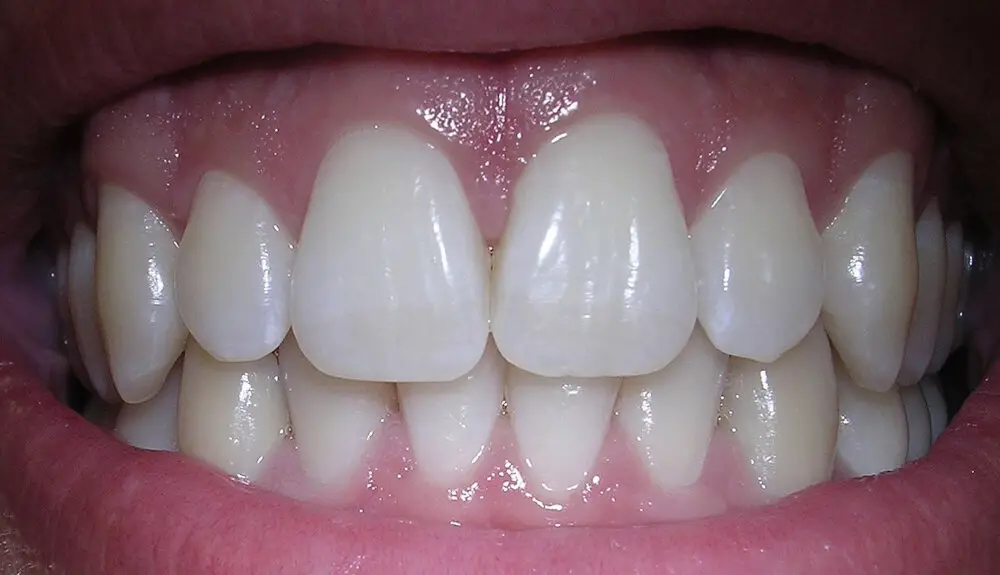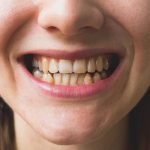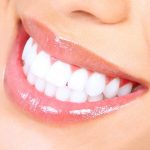Sticky Teeth: Understanding the Causes and Remedies for the Uncomfortable Sensation When Biting Down

Sticky teeth are an uncomfortable and often painful sensation that occurs when biting down on food. This condition is characterized by the feeling of food or other particles sticking to the teeth, making it difficult to chew and swallow. While it may seem like a minor inconvenience, sticky teeth can cause significant discomfort and even lead to further dental problems if left untreated. Understanding the causes of sticky teeth and the remedies available can help alleviate this uncomfortable sensation and prevent additional dental issues. The most common cause of sticky teeth is a buildup of plaque on the teeth and gums. Plaque is a sticky film of bacteria that forms on the teeth and can harden into tartar if not removed through regular brushing and flossing. When food particles come into contact with plaque, they can stick to the teeth and create a sensation of stickiness. Other causes of sticky teeth can include dry mouth, certain medications, or underlying dental issues such as cavities or gum disease. By identifying the cause of sticky teeth, individuals can work with their dentist to develop an effective treatment plan to alleviate the discomfort and prevent further dental problems.
Sticky teeth refer to the uncomfortable sensation experienced when biting down, often accompanied by a sticky feeling in the mouth. This condition can be caused by various factors, including poor dental hygiene, dry mouth, or a diet high in sugary or starchy foods. When left untreated, sticky teeth can lead to tooth decay, gum disease, and other dental issues. Fortunately, there are several remedies to alleviate this discomfort, such as brushing and flossing regularly, drinking plenty of water, and avoiding sugary and starchy foods. In more severe cases, a visit to the dentist may be necessary to address any underlying dental problems. By taking proactive steps to maintain good oral hygiene, individuals can prevent sticky teeth and maintain a healthy smile.
Sticky teeth can be an uncomfortable sensation that affects daily life in various ways. People with this condition often experience pain when biting down on certain foods, making it difficult to enjoy meals. This can lead to a loss of appetite and even malnutrition if the condition persists. Additionally, sticky teeth can cause embarrassment and self-consciousness, as bad breath and visible food particles can become a problem. Overall, the discomfort caused by sticky teeth can impact a person’s quality of life and well-being, highlighting the importance of understanding the causes and remedies for this condition.
It is crucial to comprehend the reasons and solutions for sticky teeth since it can lead to an uncomfortable sensation when biting down. The causes of sticky teeth vary from poor oral hygiene to consuming sugary or sticky foods. If left untreated, it can result in tooth decay and gum disease. Therefore, it is essential to identify the cause and take necessary measures to remedy it, such as maintaining proper dental hygiene and reducing the intake of sugary or sticky foods. By doing so, individuals can prevent future dental problems and enjoy a comfortable bite without any discomfort. Understanding the causes and remedies of sticky teeth is vital for maintaining optimal oral health and overall well-being.
Causes of Sticky Teeth

Sticky teeth are a common dental problem that can cause discomfort and pain when biting down on food. The condition is caused by the accumulation of plaque and bacteria on the surface of teeth, which can make them feel rough and sticky to the touch. Poor oral hygiene is often the main culprit behind sticky teeth, as inadequate brushing and flossing can allow plaque to build up and harden. In addition, consuming sugary and starchy foods can contribute to the problem, as these substances provide a food source for the bacteria that cause plaque. Other factors that can lead to sticky teeth include dry mouth, smoking, and certain medications that reduce saliva production. Another common cause of sticky teeth is dental work, such as braces, retainers, and other orthodontic appliances. These devices can make it difficult to clean teeth properly, leading to the accumulation of plaque and bacteria. In addition, some dental materials, such as fillings and crowns, can also become sticky over time, especially if they are not properly maintained. Other factors that can contribute to sticky teeth include tooth decay, gum disease, and certain medical conditions, such as Sjogren’s syndrome and diabetes. If left untreated, sticky teeth can lead to more serious dental problems, such as cavities, gum disease, and tooth loss. Fortunately, there are a variety of remedies available to help alleviate the discomfort and prevent further damage to the teeth and gums.
Plaque buildup is a common dental issue that occurs when bacteria accumulate on the surface of teeth and form a sticky film. This layer of plaque can harden over time, leading to tartar buildup, which can only be removed by a professional dental cleaning. Plaque buildup is a major contributor to tooth decay and gum disease, which can cause discomfort when biting down and eventually lead to tooth loss. To prevent plaque buildup, it is important to maintain good oral hygiene habits, including regular brushing and flossing, as well as visiting the dentist for check-ups and cleanings.
Dry mouth, also known as xerostomia, is a condition where the salivary glands in the mouth fail to produce enough saliva. This can lead to discomfort while eating, speaking, and even sleeping. The causes of dry mouth can range from medication side effects to dehydration, and even autoimmune diseases. The lack of saliva can also cause dental problems such as tooth decay and gum disease. Remedies for dry mouth include staying hydrated, using sugar-free gum or lozenges to stimulate saliva production, and avoiding alcohol and tobacco products. In severe cases, medication may be prescribed to increase saliva production.
Consuming sugary or acidic foods and drinks can be detrimental to your oral health. These substances can erode the enamel on your teeth, which is the protective outer layer that shields your teeth from decay. When the enamel is worn down, it can cause sensitivity and discomfort when biting down. Additionally, sugary substances can stick to your teeth and create a breeding ground for bacteria, which can lead to cavities and gum disease. It’s important to limit your intake of these types of foods and drinks and maintain a regular dental hygiene routine to prevent sticky teeth and keep your smile healthy and pain-free.
Gum disease, also known as periodontal disease, is a common dental problem that occurs when the tissues surrounding and supporting the teeth become infected. This condition is caused by the buildup of plaque, a sticky film of bacteria that forms on the teeth and gums. If left untreated, gum disease can lead to tooth loss and other serious health problems. Common symptoms of gum disease include swollen, red, or bleeding gums, bad breath, and loose teeth. To prevent gum disease, it is important to practice good oral hygiene by brushing and flossing regularly and visiting the dentist for regular check-ups and cleanings.
Certain medications can contribute to sticky teeth. Some medications, such as antihistamines and antidepressants, can cause dry mouth, which reduces saliva production and can lead to a sticky sensation when biting down. Additionally, some medications contain sugar or other sweeteners that can leave a residue on teeth and contribute to the sticky feeling. It’s important to discuss any medication concerns with your healthcare provider and maintain good oral hygiene practices to help alleviate the discomfort of sticky teeth. Brushing twice a day with a fluoride toothpaste, flossing daily, and using an antibacterial mouthwash can help remove any residue and keep teeth healthy.
Symptoms of Sticky Teeth

Sticky teeth are a common dental problem that can cause discomfort and sensitivity when biting down. One of the most common symptoms of sticky teeth is the sensation that something is stuck between the teeth, even when there is nothing there. This feeling can be very uncomfortable and can make it difficult to eat or speak properly. Other symptoms of sticky teeth may include pain or discomfort when biting down, sensitivity to hot or cold temperatures, and visible signs of plaque or tartar buildup on the teeth. If left untreated, sticky teeth can lead to more serious dental problems, such as tooth decay and gum disease. There are several possible causes of sticky teeth, including poor oral hygiene, a diet high in sugar and carbohydrates, and certain medical conditions. In some cases, sticky teeth may be caused by a lack of saliva in the mouth, which can make it difficult for food particles to be washed away. Treatment for sticky teeth will depend on the underlying cause, but may include regular brushing and flossing, changes to the diet, and the use of special dental products, such as mouthwashes or dental picks. In some cases, dental procedures, such as dental cleanings or fillings, may be necessary to remove plaque and tartar buildup and restore the health of the teeth and gums.
Uncomfortable sensation when biting down can be a distressing experience, leaving you feeling uneasy and hesitant to eat. This sensation can be caused by a variety of factors, including dental decay, cracked or chipped teeth, or even grinding teeth. Sticky foods, such as candy and gum, can also contribute to this sensation by adhering to the teeth and causing discomfort. While certain home remedies, such as avoiding sticky foods and practicing good oral hygiene, can provide temporary relief, it is important to seek professional dental care to address the underlying causes of this uncomfortable sensation. By taking proactive steps to address these issues, you can enjoy a pain-free and comfortable eating experience.
One of the most uncomfortable sensations that can occur when biting down is difficulty in speaking or eating. This can be caused by a variety of factors, including tooth decay, gum disease, or even misaligned teeth. When teeth are not properly aligned, it can make it difficult to bite down and chew food, leading to discomfort and even pain. Additionally, when teeth are decayed or infected, it can cause sensitivity and pain when pressure is applied, making it difficult to speak or eat. Fortunately, there are a number of remedies available to help alleviate these symptoms, including dental procedures such as fillings, root canals, and braces.
The sensation of teeth sticking together can be an uncomfortable and even painful experience. This phenomenon can be caused by a variety of factors, such as dry mouth, medication side effects, or dental issues. When teeth stick together, it can make biting and chewing difficult, leading to frustration and discomfort. Fortunately, there are remedies that can alleviate this sensation, such as staying hydrated, practicing good oral hygiene, and visiting a dentist regularly. Understanding the causes of sticky teeth and taking preventative measures can help individuals maintain their dental health and avoid the discomfort of teeth sticking together.
Bad breath, also known as halitosis, can be an embarrassing and uncomfortable condition that affects many people. It can be caused by a variety of factors, including poor oral hygiene, certain foods and drinks, tobacco use, and underlying medical conditions. Inadequate brushing and flossing can lead to the buildup of bacteria in the mouth, which can produce foul-smelling compounds. Certain foods, such as garlic and onions, can also leave a lingering odor. Tobacco use not only stains teeth but also causes bad breath. In some cases, bad breath can be a symptom of an underlying medical condition, such as gum disease or diabetes. Fortunately, there are remedies available, including regular brushing and flossing, tongue scraping, and mouthwash use. In more severe cases, a visit to the dentist or healthcare provider may be necessary to address the underlying cause.
Tooth decay or cavities refer to the destruction of the tooth’s hard outer layer, which is known as enamel. This process occurs when bacteria in the mouth produce acid that eats away at the enamel. Factors that contribute to tooth decay include poor oral hygiene, a diet high in sugar and carbohydrates, and dry mouth. Symptoms of tooth decay include sensitivity to hot and cold temperatures, pain when biting down, and visible holes or pits in the teeth. Treatment options for tooth decay range from fillings to root canals, depending on the severity of the decay. Maintaining good oral hygiene practices, such as brushing twice a day and flossing regularly, can help prevent tooth decay.
Remedies for Sticky Teeth

Sticky teeth can be quite uncomfortable, but there are remedies that can alleviate the discomfort. One remedy is to drink plenty of water throughout the day. Water helps to rinse away food particles and bacteria that can cause stickiness. It also helps to keep the mouth hydrated, which can reduce the occurrence of sticky teeth. Another remedy is to brush and floss regularly. Brushing twice a day and flossing once a day can help to remove plaque and food particles that can cause stickiness. It is also important to use a fluoride toothpaste to help strengthen the teeth and prevent decay. Another effective remedy for sticky teeth is to avoid sugary and acidic foods and drinks. These types of foods and drinks can cause the enamel on the teeth to weaken, making them more susceptible to stickiness. Instead, opt for foods that are high in calcium and phosphorus, such as dairy products and leafy greens. These foods can help to strengthen the teeth and reduce the occurrence of stickiness. Lastly, it is important to schedule regular dental check-ups and cleanings with a dentist. A dentist can help to identify any underlying dental issues that may be causing stickiness and provide treatment options to alleviate the discomfort. By following these remedies, you can reduce the discomfort associated with sticky teeth and maintain optimal dental health.
Maintaining good oral hygiene practices is crucial for preventing sticky teeth and other dental problems. Brushing teeth twice a day, flossing regularly, and using mouthwash can help remove plaque and bacteria from the mouth. It is also important to limit sugary and acidic foods and drinks, as they can erode tooth enamel and increase the risk of tooth decay. Additionally, visiting the dentist for regular check-ups and cleanings can help identify and address any oral health issues before they become more serious. By maintaining good oral hygiene practices, individuals can keep their teeth and gums healthy and prevent uncomfortable sensations like sticky teeth.
Drinking plenty of water is a crucial step in maintaining good oral health and preventing sticky teeth. Dehydration can cause a decrease in saliva production, which can lead to a buildup of bacteria and plaque on the teeth. By drinking enough water, you can help keep your mouth hydrated and promote saliva production, which can help wash away food particles and bacteria that can cause sticky teeth. In addition, drinking water can also help neutralize acid in the mouth, which can contribute to tooth decay and erosion. To ensure optimal oral health, it is recommended that you drink at least eight glasses of water per day and avoid sugary drinks that can contribute to dental problems.
Sticky teeth can be caused by a variety of factors, including the consumption of sugary and acidic foods and drinks. These substances can erode the enamel of our teeth, making them more susceptible to the buildup of plaque and the development of cavities. To reduce the likelihood of experiencing sticky teeth, it’s important to limit consumption of sugary and acidic foods and drinks, such as candy, soda, and citrus fruits. Instead, opt for water, milk, and healthier snack options like fruits and vegetables. Additionally, brushing and flossing regularly can help remove any buildup of plaque and keep your teeth healthy and strong.
Using mouthwash can be an effective remedy for sticky teeth caused by plaque accumulation. A good quality mouthwash contains antibacterial agents that help kill the bacteria responsible for plaque formation. It also helps to freshen breath and remove any food particles that may have been missed during brushing. However, it should be noted that mouthwash should not be used as a substitute for brushing and flossing. It should be used as an additional step in oral hygiene to maintain healthy teeth and gums. Overuse of mouthwash can also lead to dry mouth and other oral health problems, so it is important to use it in moderation.
Visiting a dentist regularly is crucial for maintaining good oral health and preventing dental problems such as sticky teeth. Regular dental check-ups can help identify potential issues at an early stage, allowing for prompt treatment and preventing further complications. During these visits, the dentist can also provide professional cleanings to remove any plaque build-up that may contribute to sticky teeth. Additionally, the dentist can offer advice on proper oral hygiene and recommend products such as mouthwash or dental floss to help keep teeth clean and healthy. Neglecting regular dental check-ups can lead to more serious dental issues, making it essential to prioritize oral health by scheduling routine visits to the dentist.
Prevention of Sticky Teeth

Sticky teeth can be quite uncomfortable, and it’s essential to understand the causes and remedies to prevent this issue. One of the best ways to prevent sticky teeth is to maintain good oral hygiene. Brushing your teeth twice a day, flossing daily, and using mouthwash can help prevent the buildup of plaque and bacteria, which can lead to sticky teeth. Make sure you brush all surfaces of your teeth, including the top, sides, and back. You should also pay attention to your tongue and gums, as bacteria can accumulate there too. Using a tongue scraper can help remove bacteria from your tongue, while flossing can help remove food particles stuck between your teeth. Another way to prevent sticky teeth is to watch what you eat. Sticky foods, such as candy, gum, and dried fruits, can stick to your teeth and cause decay. Try to avoid these types of foods or limit your intake. Instead, opt for foods that are high in fiber, such as fruits and vegetables. These foods can help clean your teeth naturally and prevent the buildup of plaque. Drinking plenty of water can also help wash away food particles and bacteria from your teeth and gums. By maintaining good oral hygiene and watching what you eat, you can prevent sticky teeth and keep your smile healthy and beautiful.
Brushing teeth twice a day is an essential habit to maintain good oral hygiene. It helps remove plaque and bacteria that can cause tooth decay, gum disease, and bad breath. Neglecting to brush teeth regularly can lead to a buildup of bacteria on the teeth, which can create a sticky film that is difficult to remove. This buildup can cause a range of dental problems, including tooth sensitivity and discomfort when biting down. By brushing twice a day, one can ensure that their teeth are clean and healthy, and reduce the risk of developing dental issues in the future. So, make sure to brush your teeth twice a day and keep your pearly whites sparkling and healthy!
Flossing daily is an essential practice to maintain good oral hygiene, and it can help alleviate the uncomfortable sensation of biting down on sticky teeth. When food particles and plaque accumulate in between your teeth, they can cause decay and gum disease, leading to tooth sensitivity. Flossing helps remove these harmful substances, preventing the buildup of bacteria and keeping your teeth clean and healthy. By incorporating flossing into your daily routine, you can prevent the discomfort of sticky teeth and promote a healthy, beautiful smile. Remember to floss gently and thoroughly, reaching every tooth and using a fresh section of floss for each tooth to avoid spreading bacteria.
Regular dental checkups and cleanings are essential for maintaining good oral health. During these appointments, a dentist can identify any potential issues such as cavities or gum disease, and provide treatment before they become more serious. Additionally, routine cleanings remove plaque and tartar buildup, which can be difficult to remove with just brushing and flossing. Neglecting regular dental appointments can lead to more serious dental problems, including the uncomfortable sensation of sticky teeth when biting down. By scheduling regular checkups and cleanings, individuals can prevent dental issues and maintain a healthy, comfortable smile.
Limiting sugary and acidic foods and drinks is crucial to protecting our teeth from the uncomfortable sensation of biting down. Sugary and acidic substances can erode the enamel on our teeth, leaving them vulnerable to tooth decay and sensitivity. It is important to avoid consuming sugary and acidic foods and drinks in excess, as they can cause a buildup of bacteria and plaque on our teeth, which can eventually lead to more serious dental issues. By limiting our intake of sugary and acidic substances, we can help maintain the health of our teeth and prevent uncomfortable sensations when biting down.
While smoking can be a tough habit to break, quitting smoking can greatly improve one’s oral health. Smoking not only stains teeth, but it can also lead to gum disease, tooth loss, and even oral cancer. The nicotine and tar in cigarettes can cause plaque build-up and weaken the immune system, leaving teeth and gums vulnerable to infection. Quitting smoking can help prevent these issues and improve overall oral health. It may also reduce the uncomfortable sensation of sticky teeth when biting down. While it may be challenging, seeking support from loved ones or a healthcare professional can increase the chances of successfully quitting smoking.
Sticky teeth can be an unpleasant and uncomfortable sensation when biting down, which can be caused by a variety of factors. It could be due to a build-up of plaque and tartar on the teeth, which can make them feel sticky and rough to the touch. Additionally, certain foods and drinks, such as sweets, soda, and sticky candies, can leave a sugary residue on the teeth, causing them to feel sticky. Other factors that can contribute to this sensation include dry mouth, smoking, and certain medications. Fortunately, there are several remedies for sticky teeth, including regular brushing and flossing, using mouthwash, and avoiding sugary foods and drinks. By taking steps to improve oral hygiene and making healthier lifestyle choices, individuals can alleviate the discomfort of sticky teeth and maintain good dental health.
Sticky Teeth is an uncomfortable sensation that can cause pain and discomfort when biting down. Understanding the causes and remedies of this condition can help prevent and treat it. One of the main causes is the accumulation of plaque on teeth, which can lead to decay and gum disease. Regular dental check-ups and proper oral hygiene can help prevent the buildup of plaque. Additionally, avoiding sugary foods and drinks can also help reduce the risk of developing sticky teeth. Remedies for the condition include brushing and flossing regularly, using mouthwash, and getting professional dental cleanings. By taking these preventative measures and seeking treatment when necessary, individuals can maintain healthy teeth and gums and avoid the discomfort of sticky teeth.
Maintaining good oral hygiene is crucial to keep your teeth and gums healthy. Brushing your teeth twice a day, flossing daily, and using mouthwash can prevent plaque buildup, which leads to gum disease and tooth decay. Regular visits to the dentist for professional cleanings and checkups can detect any oral health problems early on and prevent them from escalating into more serious conditions. Neglecting your dental health can lead to sticky teeth, an uncomfortable sensation when biting down that can be caused by several factors, including poor oral hygiene, acidic foods, and teeth grinding. By taking care of your teeth and gums and seeking professional dental care, you can avoid sticky teeth and maintain a healthy smile.
Conclusion

In conclusion, sticky teeth can be a frustrating and uncomfortable sensation to deal with when biting down. However, understanding the causes and remedies for this issue can help alleviate the discomfort. Poor dental hygiene, sugary and acidic foods, dry mouth, and medication side effects can all contribute to sticky teeth. Regular brushing, flossing, and dental check-ups, a balanced diet, staying hydrated, and adjusting medication if necessary can all help prevent and treat sticky teeth. By taking care of our oral health and making small lifestyle changes, we can ensure that our teeth remain healthy and comfortable for years to come.






